'˜We must celebrate all our war heroes and heroines' - Leeds honours forgotten British Muslim soldiers of World War One
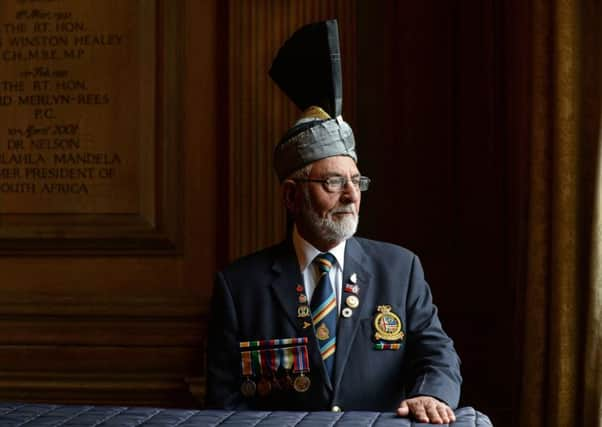

And now, more than a century after Ghulam Hassan made the first of 150 voyages during a 50-year navy career, his son is helping keep alive the memory of his father’s contribution to the allied effort in WW1 and WWII.
Mohammed Saddique, 88, from North Leeds, was among hundreds of military and civilian guests at Leeds Civic Hall earlier today (Monday), at a World War One commemoration honouring the contributions and sacrifices of Muslim soldiers who served in the British armed forces, and many who continue to do so.
Advertisement
Hide AdAdvertisement
Hide AdThe day, ‘Stories of Sacrifice’, especially honoured Sepoy Khudadad Khan, who became the first Muslim soldier to receive the Victoria Cross in 1914 for his bravery at the battle of Ypres in Belgium, where he single-handedly saw off enemy fighters despite being wounded and alone after his colleagues were killed.
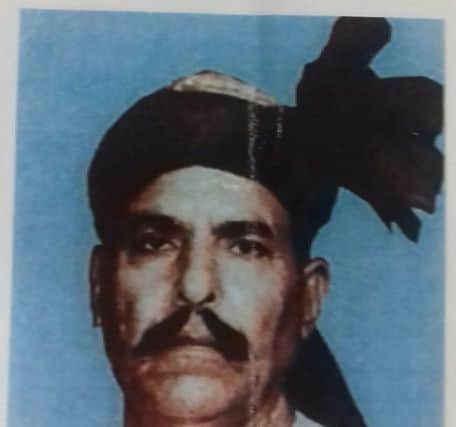

Also remembered was Noor Inayat Khan, a British secret service agent of Indian Muslim heritage who was posthumously awarded the George Cross in 1949.
The first female radio operator sent into Nazi occupied France, she was arrested and eventually executed by the Gestapo in the Dachau concentration camp.
The event heard that in total, 400,000 Muslims served in World War One with the British army, and 850,000 from other countries.
Advertisement
Hide AdAdvertisement
Hide AdAround 1.5million soldiers from the subcontinent fought for the Allies.
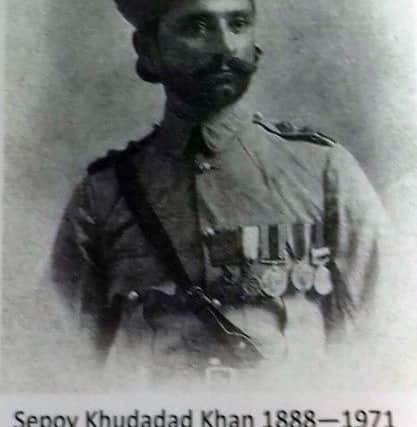

Mr Saddique’s father first joined the Navy in 1899 as a teenager, having left his home in Mirpur in present day Azad Kashmir, Pakistan - then part of pre-partition India - to board the ships at Mumbai (Bombay).
He worked as a labourer before eventually being promoted to full naval service.
Wearing his father’s medals with pride, Mr Saddique said: “Everything I am today is because of the sacrifices made by my father.
Advertisement
Hide AdAdvertisement
Hide Ad“Our family has been dedicated to serving Britain since 1899.”
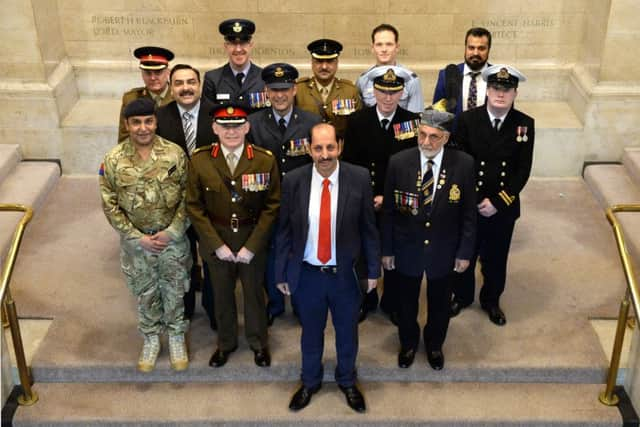

Mr Hassan undertook many tours abroad, often stopping off in Liverpool.
He died in 1950, but his military legacy continued, with many relatives going on to serve in the British army, including one of his other sons.
Also at today’s event was Ashfaq Malik, an ex warrant officer in the RAF, who is originally from Pudsey.
Advertisement
Hide AdAdvertisement
Hide AdHe served in Afghanistan as well as dozens of other tours abroad, before retiring in 2012 having served 32 years in the air force.
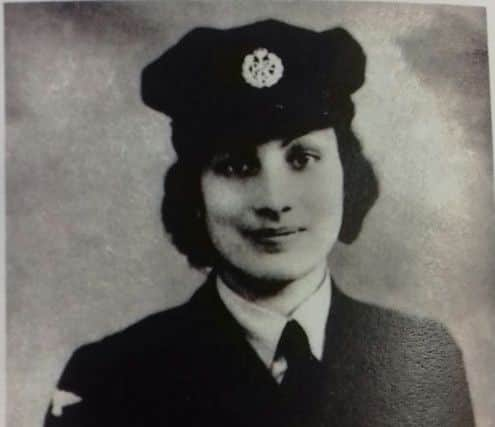

“I’m from Leeds, so it’s lovely to come back to an event aimed at the armed forces,” he said.
He said the event not only helped raise awareness of the contribution of people of South Asian heritage to the British war effort, it was also an important way to encourage people from all faiths and ethnic backgrounds to consider the armed forces as a career.
“I had a fantastic time in the RAF,” he said.
“I made friends for life, had some fantastic experiences, and travelled to over 30 different countries in my time.”
Advertisement
Hide AdAdvertisement
Hide AdHowever he acknowledged that “the world was a different place to now” when he joined, and building bridges - especially with Muslim communities who find themselves in the spotlight because of global politics - remains “one of the army’s highest priorities”.
Among the speakers today was Leeds Lord Mayor Jane Dowson, who recalled going to Belgium on a recent WW1 commemorative visit and being “struck” by the sheer number of Muslim, Hindu and Sikh names on the war memorial.
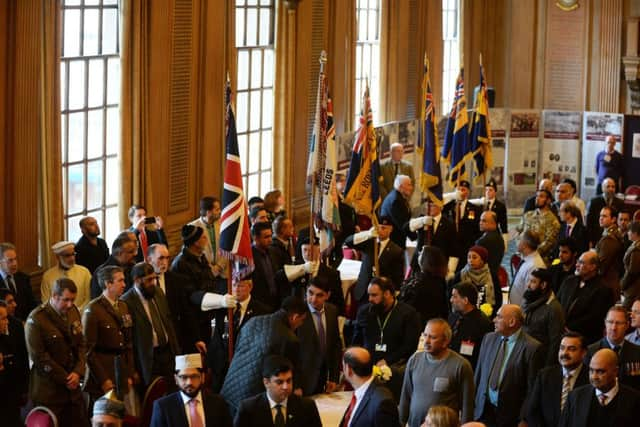

Also honouring Muslim soldiers and veterans was councillor Judith Blake, leader of Leeds City Council, who stressed the importance of “setting the record straight”.
She admitted it had “not always been the case” that “everyone’s role in history gets the full recognition that it deserves”.
Advertisement
Hide AdAdvertisement
Hide Ad“What a great opportunity today to set that record straight,” she said.
“It is a responsibility we all have to make sure that those untold stories do get the light shone on them.
“Sepoy Khan is one of those extraordinary people that we must make sure is there in the forefront of the history lessons that our young people are being taught as we go through this important year.
“We need role models - we need to celebrate our heroes and our heroines.”
Advertisement
Hide AdAdvertisement
Hide AdThe day was organised by councillor Mohammed Iqbal, formerly Leeds’s first Muslim Lord Mayor, who said: “We thank our predecessors for their services to this country and the inspiration they have provided to others to continue to serve this country today.
“In today’s challenging times, it is as important as ever that we remain united in the spirit of compassion, cohesion and community belonging.
“The stories today demonstrate what can be achieved through teamwork, dedication, loyalty, bravery and sacrifice, and it’s an example to us all.”
‘SOLDIERS FROM LEEDS AND LAHORE SWAPPED CIGARETTES FOR BOWLS OF CURRY’
Advertisement
Hide AdAdvertisement
Hide AdA powerful exhibition is chronicling the global nature of the Great War, and its impact and legacy across Yorkshire’s diverse communities.
Put together by the World War One Bradford group, it devotes a special section to the Indian Corps, from which the Muslim soldiers were drawn.
The project operates out of the Mechanics Institute in Bradford, which was the recruiting station for the Bradford Pals battalions in 1914.
Tricia Platts, who co-produced the exhibition, was at today’s event and spoke of the bonds between Yorkshire and the subcontinent that started forming on the frontline.
Advertisement
Hide AdAdvertisement
Hide AdShe quoted anecdotes - preserved in letters from the frontline - from Egypt in 1916, where hungry Leeds and Bradford Pals swapped their cigarettes for bowls of curry prepared by the Indian regiment, the Mysore Lancers, who were camped nearby.
And in Flanders in 1915, the West Riding Territorials were “hugely impressed” when they saw the surviving men of the Lahore Division march past them.
One soldier wrote: “Their physique seemed to surpass that of our own men, and they march with wonderful spirit and elan.”
A few days later, the bodies of those same men from the Lahore Division were seen lying where they had fallen.
Advertisement
Hide AdAdvertisement
Hide AdQuoting other stories of soldiers abroad, Ms Platts said: “The sense of shared remembrance so far from home is profound.
“It is this spirit of shared remembrance that we have been trying to capture in our work commemorating the Great War.
“The numbers killed are beyond comprehension, running into the hundreds of thousands. But we must always remember that every single death meant the loss of a loved one.
“Today we pay specific tribute to the service and the sacrifice and the heroism of men from the Indian army, in the realisation that like the men of the West Riding, they too fought and died on battlefields in many countries.
Advertisement
Hide AdAdvertisement
Hide Ad“The family of a Bradford man placed an inscription on his headstone which perhaps should be in our minds as we remember those of all nations who died in the Great War, and the words are these: ‘To the world he was a soldier, to me he was the world’.”
See www.ww1bradford.org for details.